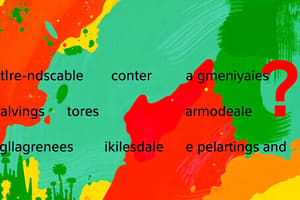Podcast
Questions and Answers
Where did Afrikaans music originate?
Where did Afrikaans music originate?
- Netherlands
- Europe
- South Africa (correct)
- United States
What influenced the evolution of Afrikaans music?
What influenced the evolution of Afrikaans music?
- Only European folk music
- Only Malay slave music
- A blend of European folk music, African rhythms, and Malay slave music (correct)
- Only traditional African rhythms
What is Volksmusiek?
What is Volksmusiek?
- A type of music played by Bles Bridges
- A genre that emerged in the 1950s
- A modern, pop-influenced genre
- Traditional folk music, often featuring instruments like the accordion and concertina (correct)
Who is a legendary Afrikaans musician?
Who is a legendary Afrikaans musician?
What is Kwela?
What is Kwela?
What instrument is often used to create lively, upbeat rhythms in traditional Afrikaans music?
What instrument is often used to create lively, upbeat rhythms in traditional Afrikaans music?
What role does Afrikaans music play in South African culture?
What role does Afrikaans music play in South African culture?
What is Ligte Musiek?
What is Ligte Musiek?
Flashcards are hidden until you start studying
Study Notes
Overview of Afrikaans Music
- Afrikaans music is a genre of music that originated in South Africa, primarily among the Afrikaans-speaking population.
- It is characterized by its unique blend of traditional folk music, European influences, and African rhythms.
History of Afrikaans Music
- Afrikaans music has its roots in the 17th century, when Dutch settlers arrived in South Africa.
- The genre evolved over time, incorporating influences from European folk music, African rhythms, and Malay slave music.
- In the 20th century, Afrikaans music became more popularized, with the rise of radio and recording technology.
Subgenres of Afrikaans Music
- Volksmusiek: traditional folk music, often featuring instruments like the accordion and concertina.
- Ligte Musiek: a more modern, pop-influenced genre, characterized by catchy melodies and simple lyrics.
- Kwela: a genre that emerged in the 1950s, known for its unique blend of traditional African music and Western instrumentation.
Famous Afrikaans Musicians
- Bles Bridges: a legendary singer and songwriter, known for his powerful voice and emotive performances.
- Cobus van der Merwe: a popular singer and musician, known for his catchy songs and energetic live performances.
- Kurt Darren: a well-known singer and songwriter, known for his unique blend of Afrikaans and English music.
Instruments Used in Afrikaans Music
- Accordions: a staple instrument in traditional Afrikaans music, often used to create lively, upbeat rhythms.
- Concertinas: a smaller, more portable version of the accordion, often used in traditional folk music.
- Guitars: a popular instrument in modern Afrikaans music, often used to create a more contemporary sound.
Cultural Significance of Afrikaans Music
- Afrikaans music plays a significant role in South African culture, particularly among the Afrikaans-speaking population.
- It is often performed at social gatherings, festivals, and cultural events, helping to promote a sense of community and cultural identity.
- Afrikaans music has also been used as a tool for social commentary and protest, particularly during the apartheid era.
Overview of Afrikaans Music
- Afrikaans music is a unique blend of traditional folk music, European influences, and African rhythms, originating in South Africa among the Afrikaans-speaking population.
History of Afrikaans Music
- Afrikaans music has its roots in the 17th century with the arrival of Dutch settlers in South Africa.
- The genre evolved over time, incorporating influences from European folk music, African rhythms, and Malay slave music.
- In the 20th century, Afrikaans music became more popularized with the rise of radio and recording technology.
Subgenres of Afrikaans Music
- Volksmusiek: traditional folk music featuring instruments like the accordion and concertina.
- Ligte Musiek: a modern, pop-influenced genre characterized by catchy melodies and simple lyrics.
- Kwela: a genre that emerged in the 1950s, blending traditional African music and Western instrumentation.
Famous Afrikaans Musicians
- Bles Bridges: a legendary singer and songwriter known for his powerful voice and emotive performances.
- Cobus van der Merwe: a popular singer and musician known for his catchy songs and energetic live performances.
- Kurt Darren: a well-known singer and songwriter blending Afrikaans and English music.
Instruments Used in Afrikaans Music
- Accordions: a staple instrument in traditional Afrikaans music, creating lively, upbeat rhythms.
- Concertinas: a smaller, more portable version of the accordion, used in traditional folk music.
- Guitars: a popular instrument in modern Afrikaans music, creating a more contemporary sound.
Cultural Significance of Afrikaans Music
- Afrikaans music plays a significant role in South African culture, promoting a sense of community and cultural identity among the Afrikaans-speaking population.
- It is often performed at social gatherings, festivals, and cultural events.
- Afrikaans music has been used as a tool for social commentary and protest, particularly during the apartheid era.
Studying That Suits You
Use AI to generate personalized quizzes and flashcards to suit your learning preferences.




